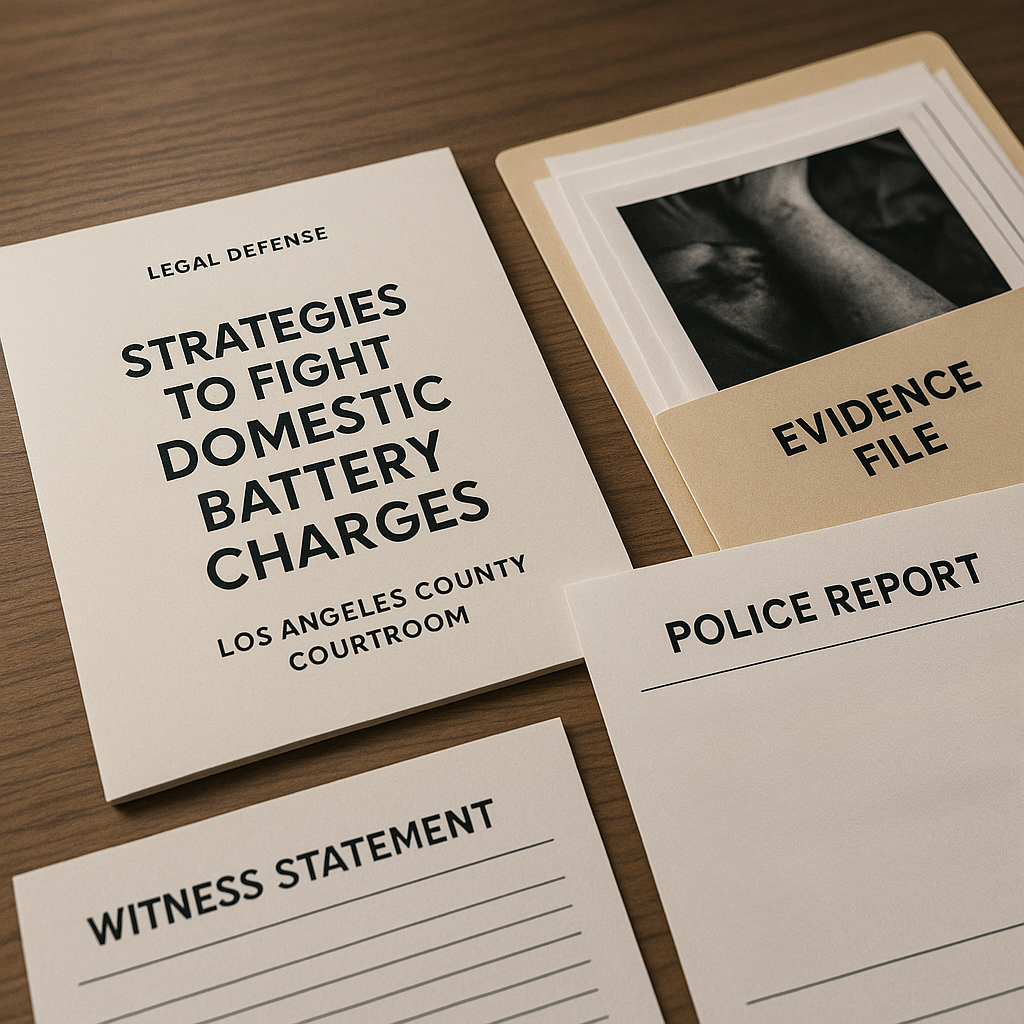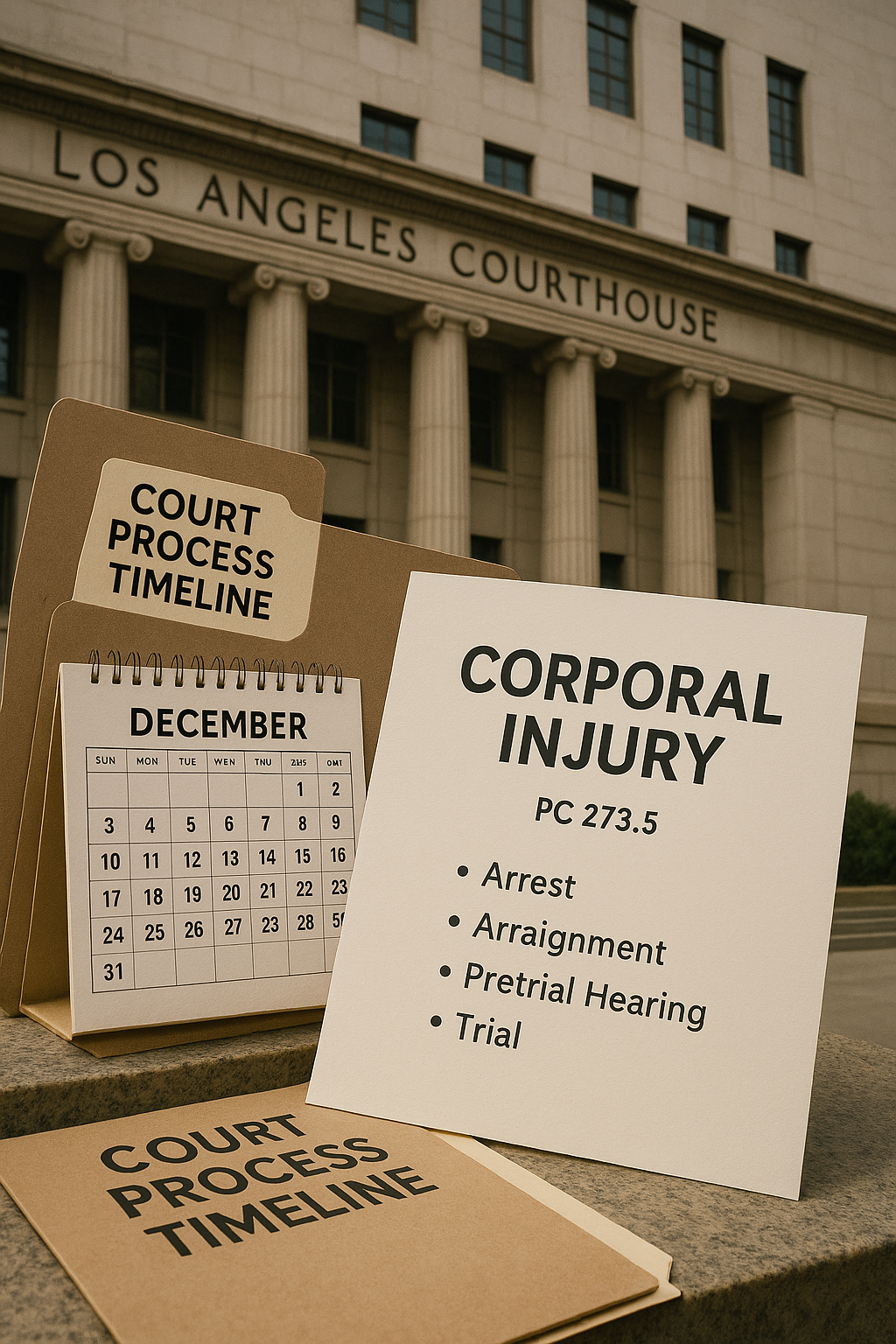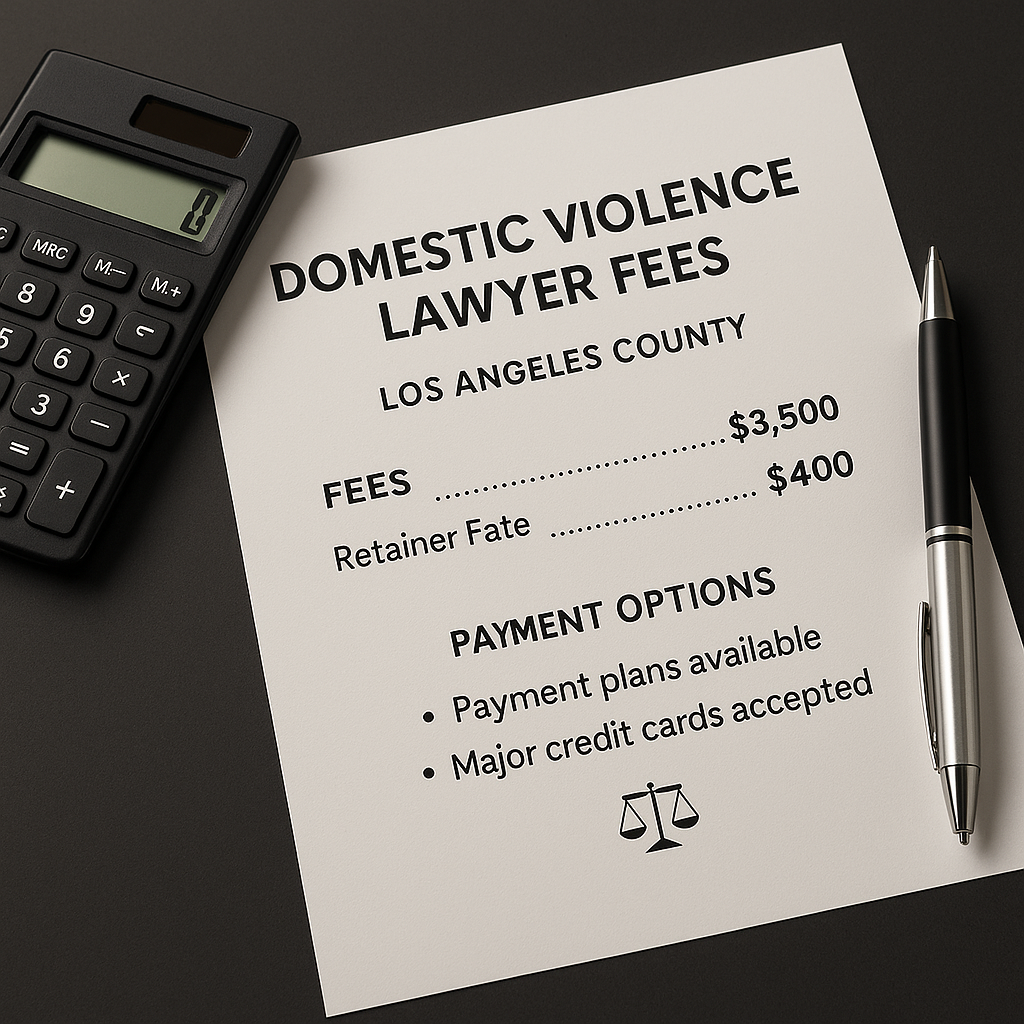How Do I Fight Domestic Battery PC 243(e)(1) Charges in Los Angeles County?
Quick Answer: You can fight domestic battery PC 243(e)(1) charges in Los Angeles County through self-defense claims, proving false accusations, challenging evidence credibility, or demonstrating lack of intent to harm.
The Short Answer
You have multiple ways to fight domestic battery charges, and many cases are winnable with the right strategy.
Successful defenses often focus on proving you acted in self-defense, were falsely accused, or that the prosecution lacks sufficient evidence for conviction. Los Angeles County prosecutors must prove specific elements beyond a reasonable doubt, creating opportunities to challenge their case through legal arguments, witness testimony, and evidence evaluation.
The key to winning your case is identifying which defense strategy fits your specific circumstances and evidence. Understanding the process after arrest helps you begin building your defense immediately, but the most important step is working with an experienced attorney who knows which arguments work best with Los Angeles County prosecutors and judges.
Your chances of beating these charges improve dramatically with early preparation and the right legal strategy.
What You Need to Know About Fighting PC 243(e)(1) Charges
Breaking Down PC 243(e)(1) Requirements
The prosecution must prove specific elements beyond a reasonable doubt.
California Penal Code 243(e)(1) requires proof that you willfully used force or violence against an intimate partner in a harmful or offensive manner. Each of these elements - willfulness, force/violence, intimate partner relationship, and harmful/offensive nature - can be challenged with the right evidence and legal arguments.
Attacking any single element can result in dismissal or acquittal.
Elements prosecution must prove:
- You willfully touched the alleged victim
- The touching was done in a harmful or offensive manner
- The alleged victim was an intimate partner as defined by law
- You had the present ability to apply force
Defense opportunities for each element:
- Willfulness: The contact was accidental or unintentional
- Harmful/offensive: The contact was trivial or consensual
- Intimate partner: No qualifying relationship existed
- Present ability: You were physically unable to cause harm
Understanding these elements helps identify the strongest defense strategies for your specific case.
Challenging the "Willful" Element
Many domestic battery cases fail because the prosecution cannot prove intent.
"Willfully" means you acted on purpose, not that you intended to break the law or cause harm. However, if the contact was truly accidental - like bumping into someone during an argument or gesturing and accidentally making contact - you cannot be convicted of domestic battery. The challenge is proving the contact was genuinely accidental rather than intentional.
Accidental contact, no matter how offensive, is not domestic battery.
Examples of accidental contact:
- Bumping into someone while trying to leave during an argument
- Hand contact while gesturing during a heated discussion
- Accidentally stepping on someone's foot in a crowded space
- Contact while reaching for something during a dispute
Evidence supporting accidental contact claims:
- Witness testimony about your behavior and intentions
- Video evidence showing the incident was clearly accidental
- Your immediate reaction and statements after the contact
- Physical layout of the location where contact occurred
The key is demonstrating that you had no intention to make harmful or offensive contact.
Proven Defense Strategies in Los Angeles County
Self-Defense and Defense of Others
Self-defense is a complete defense to domestic battery charges.
California law allows you to use reasonable force to protect yourself from imminent harm, even in domestic relationships. If the alleged victim was the aggressor, threatened you with harm, or physically attacked you first, you have the right to defend yourself with proportional force. The key is proving your belief in imminent danger was reasonable and your response was proportionate.
You don't have to retreat or avoid defending yourself in your own home.
Requirements for self-defense:
- Reasonable belief you were in imminent danger of harm
- Reasonable belief force was necessary to defend yourself
- Use of no more force than reasonably necessary
- You did not provoke or start the confrontation
Evidence supporting self-defense:
- Injuries on your body showing you were attacked
- Witness testimony about who was the aggressor
- History of violence by the alleged victim against you
- Size and strength differences between you and alleged victim
- Threatening text messages or voicemails from alleged victim
Defense attorneys often hire private investigators to interview neighbors who may have witnessed previous incidents of violence by the alleged victim.
False Accusation Defenses
False accusations are unfortunately common in domestic relationships.
Divorce proceedings, child custody disputes, immigration issues, and relationship breakups often motivate false domestic battery accusations. Experienced defense attorneys know how to investigate the alleged victim's motives and present evidence showing the accusations are fabricated or exaggerated for personal gain.
The timing of accusations often reveals ulterior motives.
Common motives for false accusations:
- Gaining advantage in divorce or custody proceedings
- Revenge for infidelity or relationship breakup
- Immigration benefits through U-visa applications
- Attention-seeking or manipulation tactics
- Mental health issues affecting perception of events
Evidence exposing false accusations:
- Timeline showing accusations coincide with legal proceedings
- History of false accusations against prior partners
- Inconsistent statements by the alleged victim
- Text messages or recordings contradicting the allegations
- Witness testimony about the alleged victim's threats to "get you in trouble"
Character evidence about the alleged victim's honesty and reputation for truthfulness can be crucial in false accusation cases.
Challenging Evidence and Witness Credibility
Most domestic battery cases rely heavily on witness testimony rather than physical evidence.
The alleged victim's testimony is typically the cornerstone of the prosecution's case, especially when there are no independent witnesses or clear physical injuries. However, witness credibility can be challenged through prior inconsistent statements, bias, substance abuse issues, mental health problems, or financial incentives to testify falsely.
Cross-examination often reveals crucial inconsistencies that create reasonable doubt.
Common credibility issues:
- Substance abuse affecting memory and perception
- Mental health conditions impacting reliability
- Financial incentives to provide false testimony
- Prior convictions involving dishonesty
- Inconsistent statements to police, doctors, or friends
Evidence challenging credibility:
- Medical records showing substance abuse or mental health treatment
- Prior inconsistent statements in police reports or recordings
- Text messages or social media posts contradicting testimony
- Criminal history involving perjury or false statements
- Financial documents showing motives for false testimony
Physical evidence challenges can also undermine the prosecution's case, especially when injuries are inconsistent with the alleged conduct or when evidence collection procedures were flawed.
What These Defenses Mean for Your Specific Case
Choosing the Right Defense Strategy
Your defense strategy should match the specific facts and evidence in your case.
Not every defense works for every case, and attempting to present contradictory defenses can confuse juries and undermine your credibility. Experienced attorneys evaluate all available evidence, interview witnesses, and develop a cohesive defense strategy that addresses the prosecution's strongest arguments while highlighting weaknesses in their case.
The best defense strategy tells a believable story that explains all the evidence better than the prosecution's version.
Factors influencing defense strategy choice:
- Strength of physical evidence against you
- Credibility and motivation of alleged victim
- Availability of independent witnesses
- Your criminal history and character evidence
- Relationship history with alleged victim
Signs that self-defense may be your best strategy:
- You have visible injuries from the incident
- Witnesses saw the alleged victim attack you first
- History of violence by the alleged victim
- Size or strength disadvantage compared to alleged victim
Signs that false accusation defense may be strongest:
- Timing coincides with divorce or custody proceedings
- No independent witnesses to the alleged incident
- Alleged victim has history of false accusations
- Strong evidence of ulterior motives
Don't try to present every possible defense - focus on the strongest arguments that fit your specific circumstances.
Working with Expert Witnesses and Investigators
Complex domestic battery cases often require expert testimony and professional investigation.
Domestic violence experts can explain the psychology of false accusations, while medical experts can testify about injury patterns that don't match the alleged conduct. Private investigators can interview witnesses, locate security camera footage, and uncover evidence that police may have missed during their initial investigation.
Professional investigation often uncovers evidence that changes the entire case dynamic.
Types of expert witnesses that may help:
- Domestic violence psychology experts
- Medical experts on injury patterns
- Accident reconstruction specialists
- Character witnesses and community members
Professional investigation services:
- Witness interviews and statement collection
- Security camera footage location and preservation
- Social media and digital evidence analysis
- Background investigations on alleged victims
- Timeline reconstruction and evidence mapping
The decision to hire experts and investigators depends on case complexity, available budget, and potential consequences of conviction.
Your Next Steps to Build a Strong Defense
Time is critical for gathering evidence and building an effective defense strategy.
Evidence disappears quickly, witnesses forget crucial details, and opportunities to challenge the prosecution's case diminish with each passing day. The sooner you have an experienced attorney investigating your case and developing defense strategies, the better your chances of achieving dismissal, reduced charges, or acquittal at trial.
Don't wait for the prosecution to build an overwhelming case against you.
Immediate steps to strengthen your defense:
- Hire an experienced domestic battery defense attorney immediately
- Photograph any injuries you sustained during the incident
- Preserve text messages, emails, and social media communications
- Identify potential witnesses who saw or heard the incident
- Avoid all contact with the alleged victim per restraining order terms
Evidence your attorney will need:
- All police reports and court documents
- Medical records for all parties involved
- Text messages and communications with alleged victim
- Photos of the incident location and any injuries
- Contact information for potential witnesses
Contact our experienced domestic battery defense team for a free consultation about defense strategies specific to your case and circumstances.
Early intervention allows attorneys to conduct independent investigations, interview witnesses while memories are fresh, and present evidence to prosecutors that may lead to dismissal before trial. The defense strategies that work best often require time to develop and implement properly.
Understanding whether you're likely to face jail time can help determine how aggressively to defend your case and what resources to invest in your defense. Many domestic battery cases can be won with the right preparation and legal strategy.
Your future depends on the defense decisions you make in the coming days and weeks.
FAQ
Q: Can I defend myself if the alleged victim was bigger and stronger than me?
A: Self-defense isn't limited by size differences. If you reasonably believed you were in imminent danger, you can defend yourself with proportional force regardless of size differences.
Q: What if there are no independent witnesses to support my defense?
A: Many successful defenses rely on circumstantial evidence, prior inconsistent statements, or credibility challenges rather than independent witness testimony.
Q: Can I use evidence of the alleged victim's violent history in my defense?
A: Evidence of the alleged victim's violent character may be admissible to support self-defense claims or show your reasonable fear of harm, depending on specific circumstances.
Q: How important is it to have an attorney who specializes in domestic battery cases?
A: Specialization is crucial because domestic battery cases involve unique evidence issues, local prosecutor relationships, and defense strategies that general criminal attorneys may not understand.
Ready to build a strong defense? Contact our experienced Los Angeles County domestic battery defense attorneys for a free consultation about your case.

.webp)



